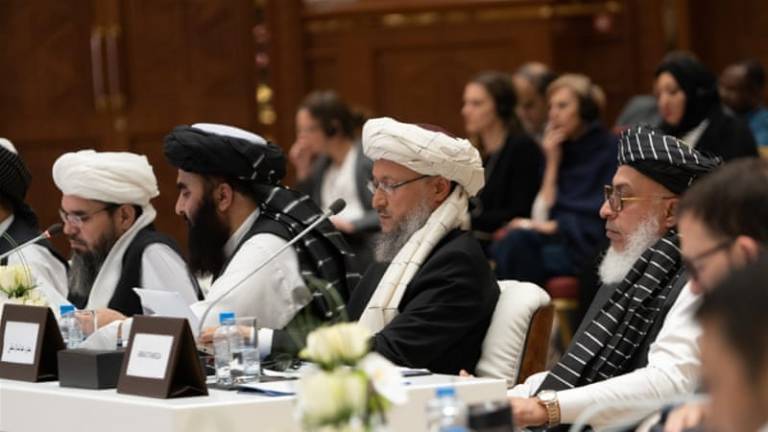The United States of America is going to sign a peace deal with the Taliban representatives in Qatar’s capital, Doha, nearly after two years of talks. Representatives of fifty countries, including Pakistan which is a key supporter of peace deal, will attend the signing ceremony. On behalf of the United States, Secretary of State, Mike Pompeo is expected to shake hand with the Taliban leaders, and ink the deal which will pave the way for withdrawal of US troops from Afghanistan and bring the insurgent leaders to the capital Kabul to sit with the Afghan government to discuss the future of the country.
Nearly two decades ago in response to Nine Eleven attack the United States, under President George W Bush, invaded Afghanistan and topped the Taliban regime. In the last 18 years, the US spent more than 750 billion USD to help institution buildings and the country’s reconstructions. The war took thousands of American and its NATO allies lives. According to an official report by the Afghan government, over 45,000 Afghan soldiers lost their lives in the last five years.
In a statement issued on Friday, February 28, the US President Donald Trump, who is seeking a re-election, said “we will have a powerful path forward to end the war in Afghanistan and bring our troops home if the Taliban and Afghan government live up to the commitments in the agreement.”
What does the agreement bring?
Under the agreement, the US pulls out its troops and the Taliban vow not to let extremist parties to use Afghan soil for attacking interests of the US and its allies. Under the deal, the Taliban leaders sit with the Afghan government and leaders of political factions to discuss the future of the country. Under this peace agreement, 5000 Taliban prisoners, who are kept in Afghan-run jail, are agreed to released, and in return, the Taliban should release Afghan soldiers, who are captive in Taliban controlled areas.
It is not yet clear who will represent the Afghan government in the intra-Afghan dialogue, which as per the agreement must take place between the Afghan government, leaders of political factions, and the Taliban representatives. The position of the Afghan government seems oscillating as it is divided over election crisis. After the incumbent Afghan president Ashraf Ghani was declared the final winner of the Afghan presidential elections, his main rival Abdullah Abdullah, who is supported by powerful ethnic Uzbek and Hazara leaders, contested the announcement, stating that he would form his own inclusive parallel government.
Naysayers in Kabul
Witnessing a deal being signed with a group responsible for taking thousands of innocent lives is not conformable for victims’ families who have lost dear members and near relatives in suicide bombings and violence carried out by the Taliban. The Taliban, mainly the Haqqani Network led by Sirajuddin Haqqani, have been behind many high-profile targets which killed hundreds of thousands of innocent Afghan in Kabul and other major Afghan cities.
The signing of agreement is also troubling for minority groups, in particular women rights activists who are aware of Taliban’s conservative attitude towards women. Prior to signing agreement, a Taliban second-in-command, Sirajuddin Haqqani, in a piece published by The New York Times, said they would respect women rights within framework of Islam.
But many rights group, critic of Taliban’s interpretation of Islam, see the deal as a direct compromise on women rights. They say the Afghan government along with Afghan factions opposing Taliban style of governance should not concede to everything the Taliban may demand. The most effected group are the Afghan Sikhs who are an underrepresented minority group in the country.
Uncertain future
If the deal is successful, in the first phase, the US will reduce its troops to nearly 8000. For the time being, there are nearly 14000 US troops stationed in the country. Given the complexity of war and peace, the question whether the Taliban fighters—who are loyal to various commanders—surrender to the Afghan government or continue threatening Afghan peace arrangement, remains unclear. It is not clear how the Taliban leaders will deal with the Afghan constitution and what role they want to play in post peace agreement setup.




